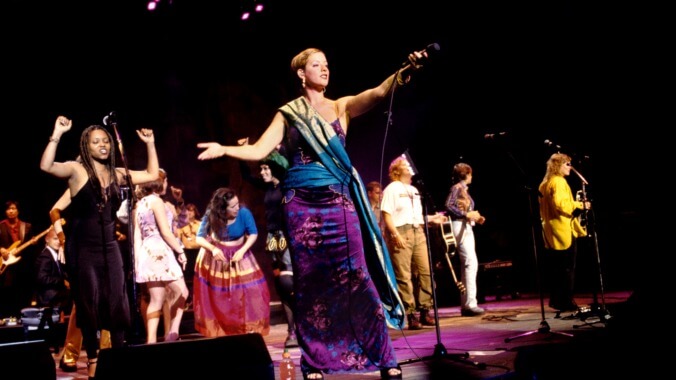‘Lilith Fair: Building a Mystery’ Strikes a Timely Chord in These Exceedingly Hellish Times
"Big surprise: women and a diverse group of people built a better system," filmmaker Ally Pankiw told Jezebel.
Photo: Getty Images EntertainmentMovies
Once upon a time, a Grammy-winning singer-songwriter convened a who’s who of her female and femme peers—from industry native to neophyte—for a special string of concerts in sprawling amphitheaters and sacred fields across the country. Perhaps you’ve heard of it. Maybe you, or someone you know, was even there.
For three summers, Sarah McLachlan’s brainchild, Lilith Fair, did the so-called impossible: established itself as a safe space for women and queer concert-goers, and became the top-grossing festival of the nineties. Now, it’s a supernova, the stuff of musical lore—hallowed by its headliners and attendees, and even more so by those who were too unlucky or too young to go. Filmmaker Ally Pankiw counts herself in the latter category.
In Lilith Fair: Building a Mystery, which premiered at the Toronto International Film Festival (TIFF) on September 13 and will stream on Hulu and Disney+ on September 21, Pankiw pays homage to the house that McLachlan (and several others) built. Its origin unspools with the help of more than 600 hours of never-before-seen archival footage and photographs and several touching sit-downs not only with its stars, like The Indigo Girls, Sheryl Crow, Erykah Badu, and Paula Cole, but also with the people who worked tirelessly behind the scenes to make it happen, including McLachlan herself.
“Everyone wanted to talk about the special place I think that Lilith holds in their hearts, and how much of a little bubble of joy it was in a very bleak time for a lot of the demographics that Lilith spoke to,” Pankiw told Jezebel on a recent Zoom call.
-

-

-

-

-

-

-

-

-

-

-

-

-

-

-

-

-

-

-

-

-

-

-

-

-

-

-

-

-

-

-

-

-

-

-

-

-

-

-

-








































